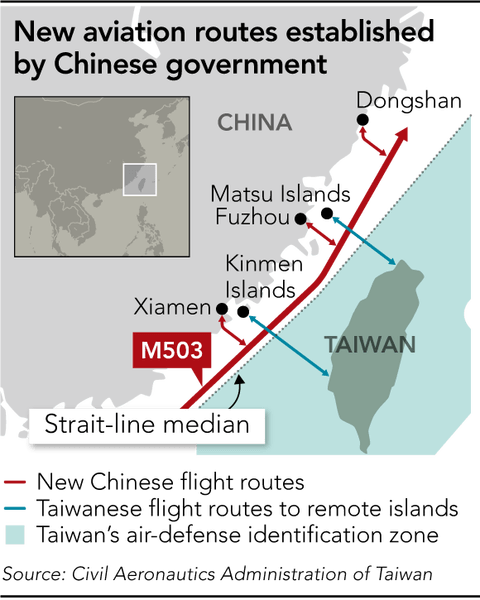 View of the Taiwan Strait from Taipei Harbor ©Yukai Wang
View of the Taiwan Strait from Taipei Harbor ©Yukai Wang
Since the beginning of 2018, dark clouds have been gathering above the Taiwan Strait. From China opening the controversial M503 flight route (see the route map below) to the U.S. Congress passing Taiwan Travel Act, to the military exercises in the strait, recent developments of the fragile cross-strait relations have stirred up new waves of speculations on a potential military conflict in the region. Beijing’s cross-strait communication is facing the biggest challenge in years.
What is the Mainland’s Taiwan narrative?
Beijing’s Taiwan narrative asserts that: (1) The fellow Chinese living on both sides of the strait share a bond of kinship and the common mission to work for the nation’s greater good. (2) The conflict with Taiwan will be solved in a peaceful process under the recognition of “one China.” (3) China’s sovereignty over Taiwan is indisputable and it will never tolerate any activities promoting “Taiwan independence.” However, for five reasons, Beijing’s narrative is gradually failing to achieve its strategic communication goals.
Reason one: Taiwan’s changing identity
One of the assumptions of mainland China’s narrative about identity is that the mainlanders and Taiwanese people belong to the same identity group. By reminding the Taiwanese of historical facts, the Mainland hopes to shape their behaviors and make them aspire to unification, without considering the memory gap between the two sides due to the civil war ended in 1949, the Japanese occupation of Taiwan, and a different democratization process on the island. In the time of isolation, the old Taiwanese identity, which Beijing kept recalling, was reconstructed to a new one. As a result, a decreasing number of Taiwanese compatriots identify themselves as Chinese or Chinese/Taiwanese at the same time. While Beijing designs the narrative based on the experience of its own identity group, Taiwan has activated its own reasoning process that people from other groups will not necessarily understand. Therefore, Beijing’s narrative is not culturally congruent to Taiwanese people and is speaking a language that does not fit into the changing Taiwanese identity. Thus, a large part of Taiwan does not share the vision of unification with the Mainland.
Reason two: the dilemma of the One-China policy
Narratives have to be sufficiently flexible to allow description so that when events threaten to contradict the narrative, it can be seen to be unaffected. But for China, such flexibility is off the table. On the one hand, territorial sovereignty is a non-negotiable issue for Beijing, who repeatedly emphasizes its hard position on “there is only one China”, which is the essence of the One-China policy and a precondition for any official dialogues. On the other hand, several Taiwan Democratic Progress Party leaders have publicly refused to accept the one-China claim, resulting in the shut-down of official communication channels. If the two parties do not talk to each other, establishing a mutual understanding can be extremely difficult.
Reason three: the narrative contestation
The reception of Beijing’s narrative is subject to contestation because actors with different agendas compete to win over the Taiwanese audience, taking advantage of the ideological disjuncture. For example, in January 2018, China opened the M503 civil flight route to ease the air traffic congestion near its southern coast. The action was framed by the ruling party in Taiwan as a “military provocation.” The politicians injected their counter-narrative to harness support for upcoming elections and to save the plummeting approval rating.

Reason four: the different information infrastructures
Political actors must take into consideration the information infrastructure and information consumption behavior of the audience. The two sides of the strait have different TV networks, different printed media, and different social media. More importantly, the news outlets are controlled by entities with different agendas. The evolving communications technology should facilitate connectivity between leaders and the public. However, China’s semi-open Internet environment is far from promoting the effective dissemination of its narrative in Taiwan because people from the two sides are still confined in separate echo chambers and are receiving different messages. The Mainland needs to break those walls to insert its narrative into Taiwanese people’s lives.
Reason five: the U.S. factor
To Taiwan, the U.S. is a strategic partner that supports its secessionist activities by selling arms and offering military protection (but only enough to maintain the status quo). To China, the U.S. is a competitor who attempts to contain Chinese nation’s rising power. The Taiwan issue has been the largest stumbling block in the U.S.-China relations. Despite the potential trade war, China is more concerned about America’s recent moves regarding Taiwan, including the passing of Taiwan Travel Act, which enables high-level official visits from both parties. In response to the increasing American support for Taiwan, the Mainland announced it will hold live-fire military exercises in the Taiwan Strait.
Is assertiveness plus military might the right formula for peaceful unification? Looking back into history, national assimilations always happen when economic integration and cultural amalgamation are combined. To achieve that, China needs to foster a more complex understanding of strategic narrative, which should be audience-based and culturally congruent. A successful narrative must inspire the Taiwanese people to a future where their identity remains intact, where they enjoy prosperity, where they share the same vision with brothers and sisters in mainland China.
Caveat: The opinions expressed in this blog are those of the author. They do not necessarily express the views of either The Institute of Public Diplomacy and Global Communication or The George Washington University.

This is one of the most fascinating public-diplomacy relationships out there right now. It’ll be fascinating to see if Taiwan and China can ever get on the same page.